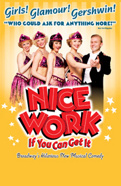Nice Work If You Can Get It Star Judy Kaye on Her Career as a ‘Pushy’ Broadway Dynamo
About the Author:
Tony winner Judy Kaye first burst onto the Great White Way as a Rizzo replacement in the original production of Grease, but it wasn’t until the actress turned 29 that she established herself as a comedic Broadway force to be reckoned with. When Madeline Kahn withdrew from Broadway’s On the Twentieth Century, Kaye, her understudy, stepped up to rave reviews. The actress went on to demonstrate her impressive vocal range in her Tony-winning portrayal of Carlotta in The Phantom of the Opera, her comic timing as Rosie in Mamma Mia! and her political chutzpah as Emma Goldman in Ragtime. Now, Kaye is battling bootleggers as Duchess Estonia Dulworth in the new Prohibition-era Gershwin musical Nice Work If You Can Get It, starring opposite Kelli O'Hara and Matthew Broderick. Below, Kaye recounts a few of her favorite roles and reveals her process for creating a new character on Broadway.
![]()
From the time I was cast as Lucy van Pelt in the Los Angeles company of You’re a Good Man, Charlie Brown back in nineteen-aught-three, somebody saw a strong, pushy person in me. Since then, I’ve found myself cast as “the pushy one” a lot. It’s fun—and often, the characters I play are Lucy in another dress. Emma Goldman in Ragtime? She’s Lucy as a Russian émigrée who’s fighting for the rights of little people. Florence Foster Jenkins in Souvenir is a strong lady too, but as it turns out, she discovers that she has doubts. I love it when a character learns something! That’s what I look for when I’m accepting roles. I love when there’s a surprise that changes the character. And in Nice Work If You Can Get It, Estonia Dulworth certainly has a change of heart.
Estonia, the Duchess of Woodford, has just returned to the United States from England. There was a time in history when wealthy American women married into British royalty because the royals were running out of money. As in Downton Abbey, these young women were being married off to titled British families, and Estonia is one of those ladies. She married this British guy, but he immediately kicked off, so she has come back to the United States to help her brother, Senator Max Evergreen, fight the war on booze—on “Demon Rum.” Estonia is a prohibitionist, so in Nice Work, she’s going in with her ax and torching speakeasies. Pretty pushy, huh?
Creating a new character from scratch is exciting and maybe a bit of a scary process. You’ve gotta throw yourself in there and feel your way through it. You have to be willing to take a dive, literally and figuratively. In a comedic character role, it’s so easy to get sidetracked into doing bits. You have to be conscious of the character’s through line, the arc and the overall journey, and stay true to it.
In Nice Work, I have a long break in the first act where I’m in my dressing room, trying not to lose the essence of Estonia. I listen intently to what’s happening onstage before I come back out. It’s much easier to keep the character’s through line intact when you show up more frequently throughout the evening. That doesn’t mean I stay in character offstage, necessarily, although I know actors who work that way. But you have to stay in touch with the action even when you’re in your dressing room doing your taxes.
I’ve learned from every role I’ve ever had, from shooting commercials to starring on Broadway. In On the Twentieth Century, I had the chance to work with Kevin Kline, who was a relative newbie on the block at the time, but such an incredibly gifted actor. From the moment I met him, I knew I was in the presence of greatness. When I was understudying the role of Lily Garland, I went up to Kevin on the first day of rehearsal and said, “You’ve heard it here first: You are going to win a Tony Award for this part.” He created that character out of whole cloth, even when there was nothing on the page. Kevin is a terrific character actor—he knows how to dig through the rubble and find the heart of the character and, ergo, the comedy and pathos. This is what all actors who play these kinds of character roles hope to do.
Kelli O’Hara, Matthew Broderick and everyone in the cast: We’re all in this together. I feel really, really fortunate to be in Nice Work If You Can Get It. As a company, we support and give one another room to grow. It’s exciting to see how Estonia fits within the tapestry of characters each member of the cast has created. In Nice Work, I’m often playing the straight man, which I find to be just as much fun as having the punch line. It’s important, because if I screw up a setup, it wouldn’t be fair to my castmates. But whether I’m setting up another actor or saying the punch line, the whole thing is really fun. I love what I do! And I don’t think audiences will be able to wipe the smiles off their faces for a week after they see this production.

